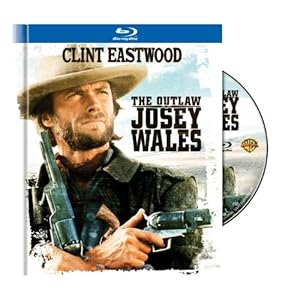

Orson Welles famously said of Clint Eastwood's The Outlaw Josey Wales "that it belongs with the great Westerns," and Eastwood maintains that it's at least as good, if not better, than his Oscar-winning Unforgiven. Though I humbly disagree on both counts, The Outlaw Josey Wales is a savvy stepping stone between the classic Westerns and modern sensibilities, and its quirky depiction of alternative family units was ahead of its time as a mainstream movie theme.
The film derives from the novel Gone to Texas by Forrest Carter, the pen name of—gulp—dedicated white supremacist Asa Earl Carter. According to producer Robert Daley, Carter pissed on Daley's office carpet and later pulled a knife on one of his secretaries. Taken aback but undeterred, the filmmakers proceeded, from a screenplay credited to Phil Kaufman and Sonia Chernus. Kaufman was to direct, but his discomfort with Carter's "insane" anti-government stance drove a wedge between Kaufman and leading man Eastwood, who approved of the dramatic conflict and, presumably, the allegorical significance of his protagonist resisting a runaway government (given the still-fresh wounds of Watergate and the Vietnam War). Kaufman exited the film and Eastwood stepped in as director.
A Missouri farmer, Josey Wales spirals into darkness when marauding Union guerillas kill his wife and towheaded “Little Josey” (played by Eastwood's son Kyle). Spiritually lost, Josey dedicates his hollow existence to revenge alongside Confederate guerillas. At war's end, Wales remains on the run: the powers that be consider him unfinished business, with renewed urgency after he lays waste to the murderous Yankees that greatly outnumber him. The Outlaw Josey Wales fits neatly into the Eastwood formula of pumping up his stoic machismo with a variety of relatively expressive foils: first, a callow, foolish youth (Sam Bottoms); then an old Native American man (Chief Dan George as Lone Watie); then a Navajo squaw in distress (Geraldine Keams); then two more damsels in distress: an old white lady (Paula Trueman) and her waifish daughter (Sondra Locke, then Eastwood's romantic partner).
Though the story is pat in its depiction of a hard man gradually softened by his surrogate family, there's pleasure to be had in the memorable one-liners, the irreverent humor in the relationship between Josey and Lone Watie (who is, refreshingly, treated neither as a caricature nor with kid gloves), and the Western action against the backdrop of frontier scenery. The theme of the futility of war still resonates, as established in a expectation-defying, impromptu summit between Josey and Cherokee chief Ten Bears (Will Sampson). But for all the lip service paid to peace, it must first be bought with vengeance that quenches the audience's bloodthirst, a climax played for no apparent irony before the film's Shane-esque ambiguous resolution.

|
|
 |
Warner's Digibook Blu-ray release of The Outlaw Josey Wales boasts a colorful 32-page booklet with essays, an Eastwood bio, and trivia, as well as top-notch hi-def specs. By all appearances, the transfer recreates the film's original theatrical look, with especially high marks for deep blacks and smooth retention of grain; color and contrast appear spot-on, and detail and texture are fine. The picture sounds just as good in its lossless DTS-HD Master Audio 5. 1 mix, which makes good use of the soundfield and delivers dialogue with consistent clarity.
The disc boasts a brand-new commentary by film critic and Eastwood biographer Richard Schickel, the leading authority on Eastwood's oeuvre. Schickel covers the bases of the film's road to and through production, as well as its thematic content and place in Eastwood's career and art.
The brand-new featurette “Clint Eastwood’s West” (29:03, HD) nicely summarizes the filmmaker's Western efforts, with comments by Eastwood, director James Mangold, Spaghetti Western author Sir Christopher Frayling, director John Lee Hancock, director Kevin Costner, director Frank Darabont, Morgan Freeman, Pale Rider associate producer and Unforgiven executive producer David Valdes, Unforgiven screenwriter David Webb Peoples, Heroes in Hard Times author Neal King, Unforgiven editor Joel Cox, and Midnight Run screenwriter George Gallo.
The 1999 doc “Hell Hath No Fury: The Making of The Outlaw Josey Wales” (30:29, SD), narrated by John Milius, features a wealth of footage of Eastwood directing the film, as well as interviews with Eastwood, Bill McKinney, Sam Bottoms, John Vernon, Cox, and Geraldine Keams.
Vintage promo “Eastwood in Action” (7:55, SD) also includes candid set footage and observations by Eastwood.
Finally, the disc includes the film's “Theatrical Trailer” (2:16, HD).
 |